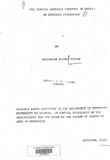The vehicle assembly industry in Kenya: An economic evaluation

View/
Date
1983Author
Murage, Zacharia N
Type
ThesisLanguage
enMetadata
Show full item recordAbstract
The manufacture and assembly of vehicles is more efficiently done in large plants where long production runs are possible. But small industrializing, developing countries have gone into both manufacture and assembly of transport vehicles. This has resulted in short and inefficient production runs underutilized installed capacity and expensive vehicles that are major users of foreign exchange. The analysis of Kenyan data, collected from
primary and secondary sources, shows that the 94 vehicles assembled locally are an unnecessary
differentiation and impose high per unit assembly costs. This differentiation~has contributed to capacity
underutilization. Moreover, installed capacity is manifestly excessive. Furthermore, deletion allowances are lower than overseas per unit production costs and these allowances are small fractions of local per unit production costs. This discourages local sourcing. Additionally, the assemblers do not aggressively search to raise local components usage and they even reject components approved by the national quality standards bureau. Hence, local content in domestically assembled vehicles is low and import content high. This makes the vehicle a heavy user of foreign exchange and an inefficient saver or earner of foreign exchange.
Worse still, employment - output elasticity is negative and Kenyanization of personnel has stagnated: key
management positions are held by expatriates although the ownership of equity is mostly local. These findings suggest that the vehicle assembly industry is an.inefficient user of scarce economic resources. This situation should be remedied and national objectives pursued more strictly. Vehicle models, plants, franchise importers and distribution and service~points should be drastically reduced. The resulting efficiency would reduce the ex-assembly cost of the vehicle by 7.7..per cent, assembly charges by 67 per cent and retail prices of vehicles by between 20 and 25 per cent. These cuts are substantial. To achieve these gains, the government should use its political and licensing powers plus voting rights in the assembly plants to streamline the industry. Furthermore, deletion allowances should be re-negotiated, work permits sharply reduced, more dependence on national standards imposed and the price control formula reformed. Penalties should be meted out against defaulters. Finally, exporting should be promoted through intercountry cooperation, usage of the multinational firms operational network and barter arrangements.
Citation
M.A (Economics) Thesis 1983Sponsorhip
University of NairobiPublisher
Depatment of Economics, University of Nairobi
Description
Master of Arts Thesis
